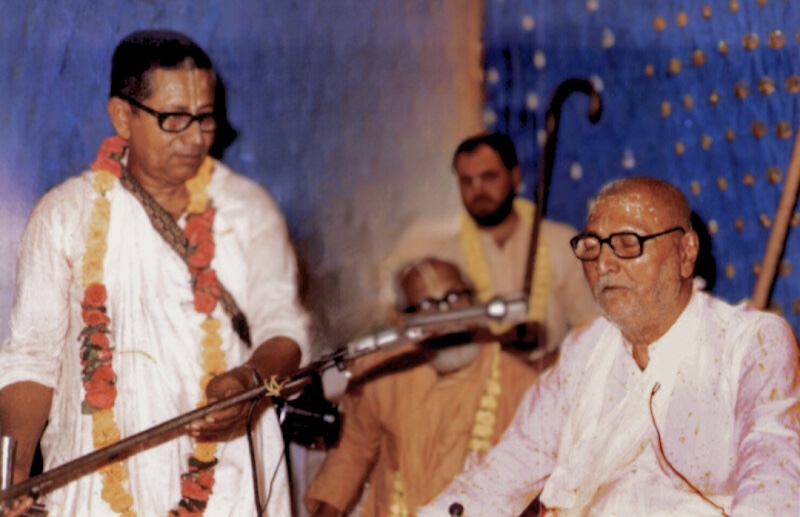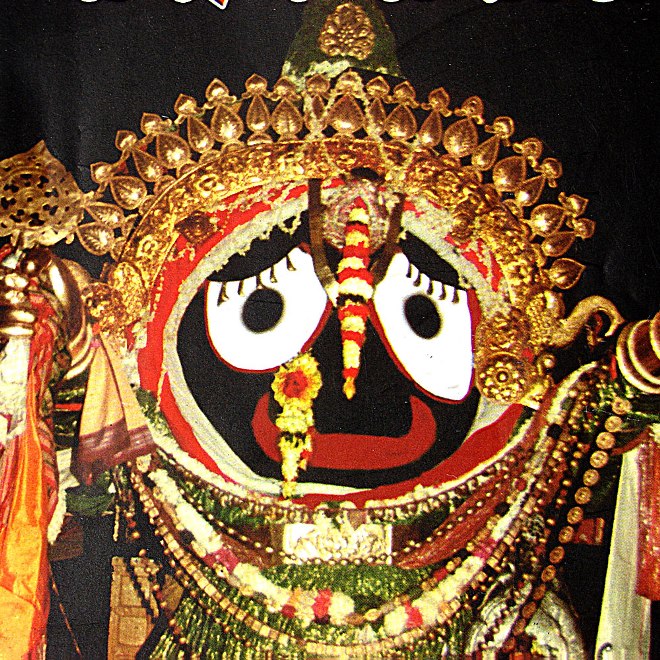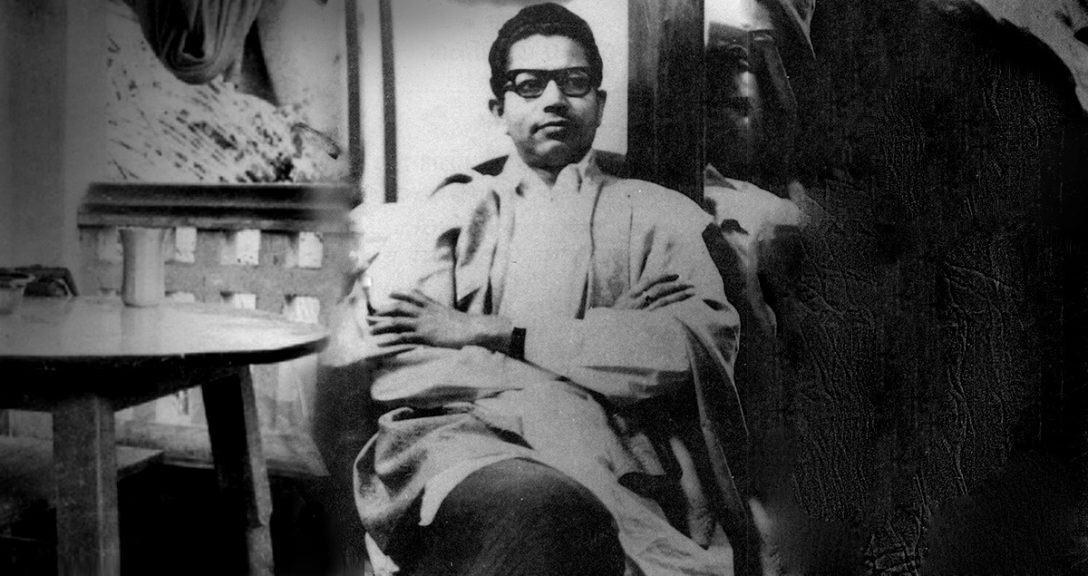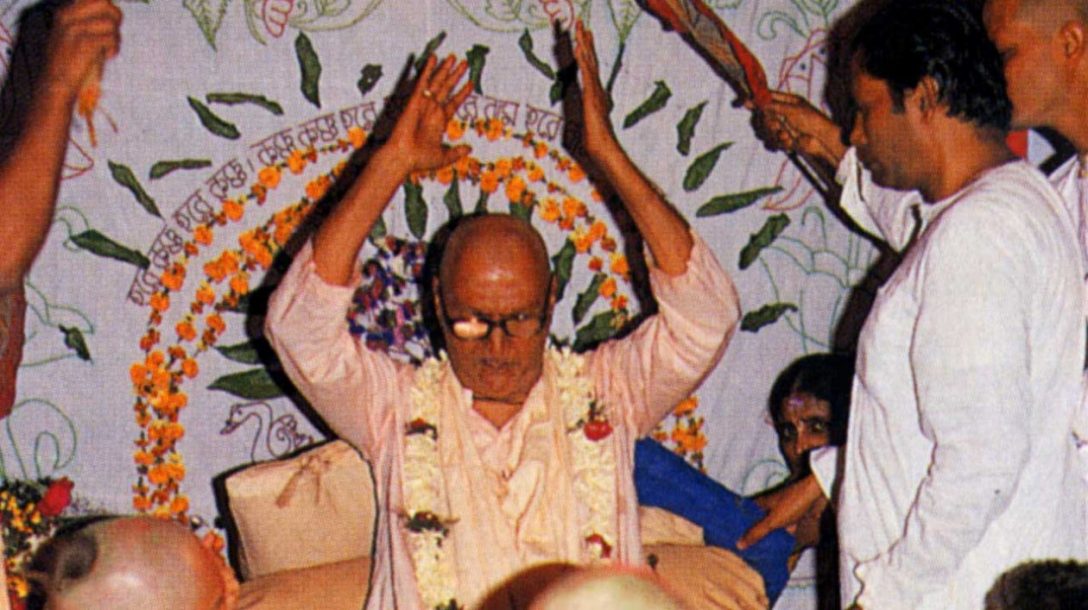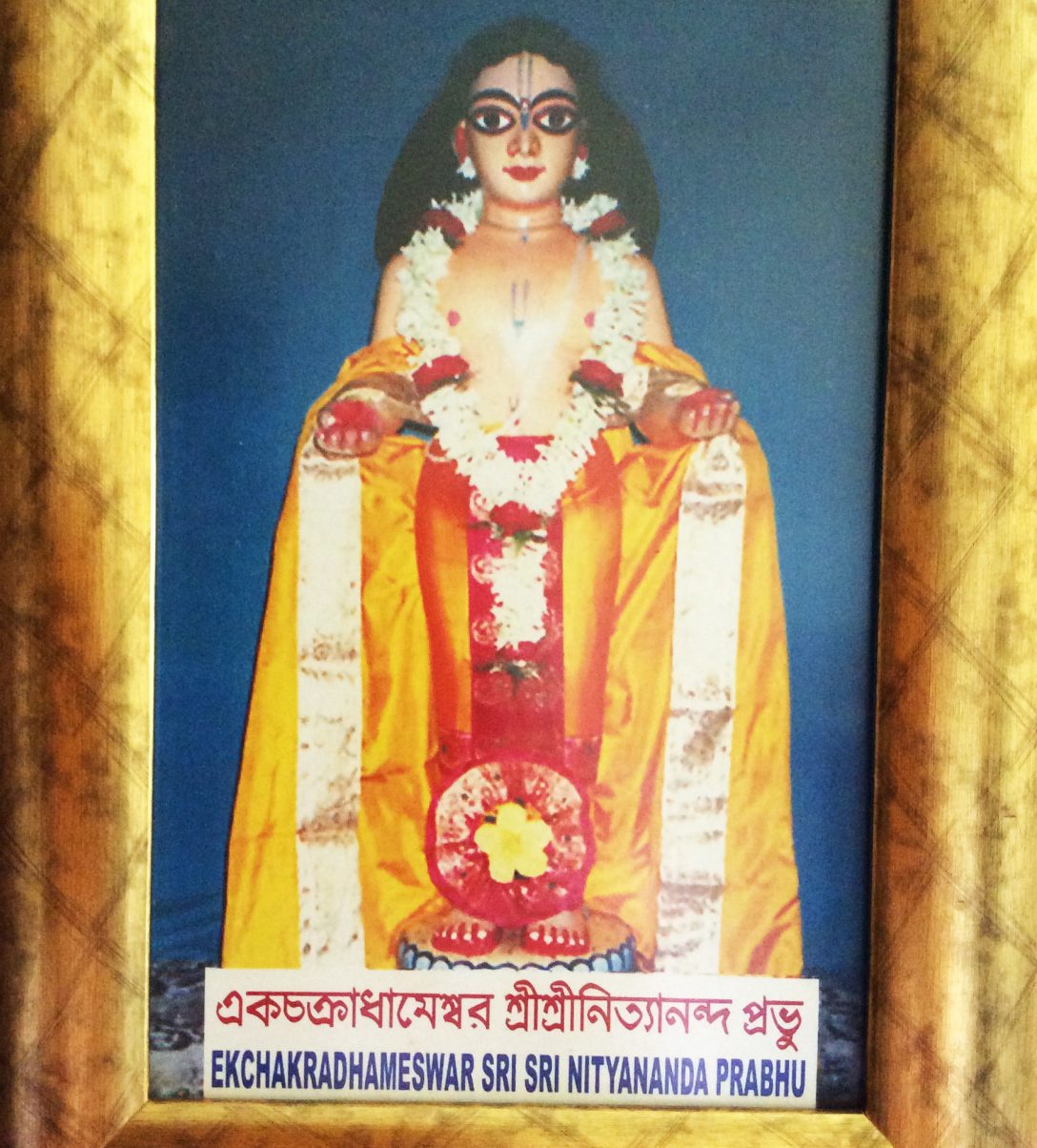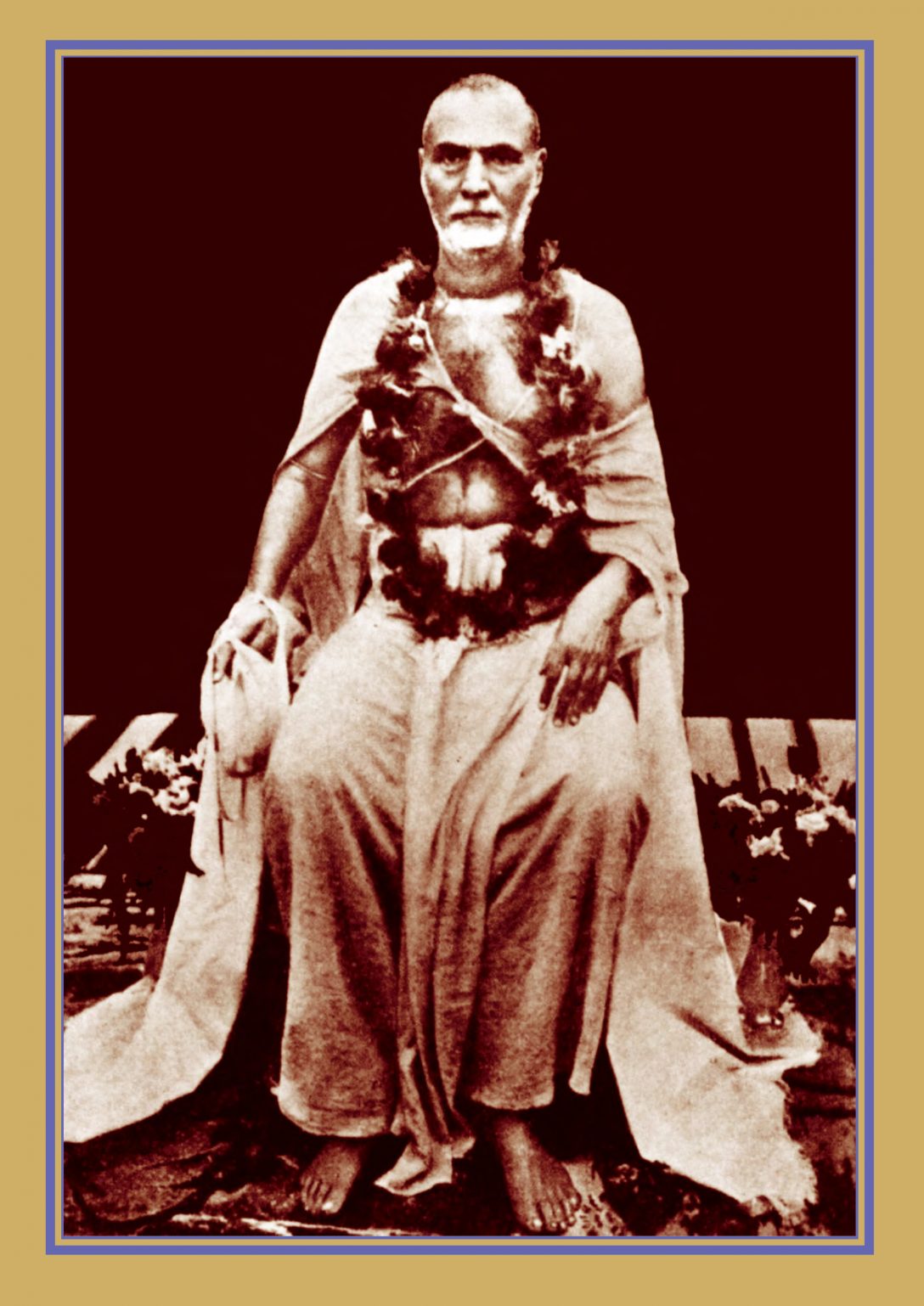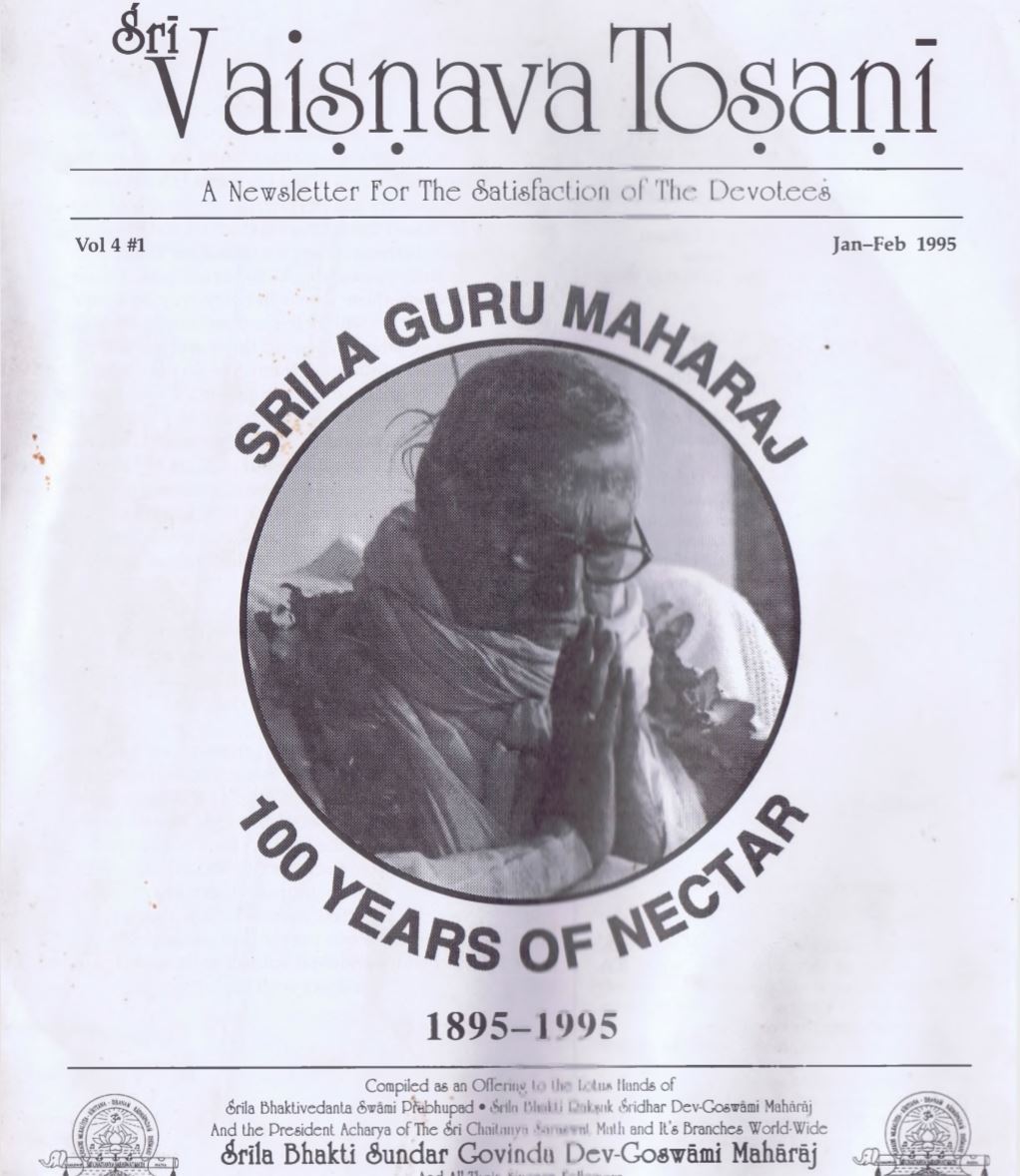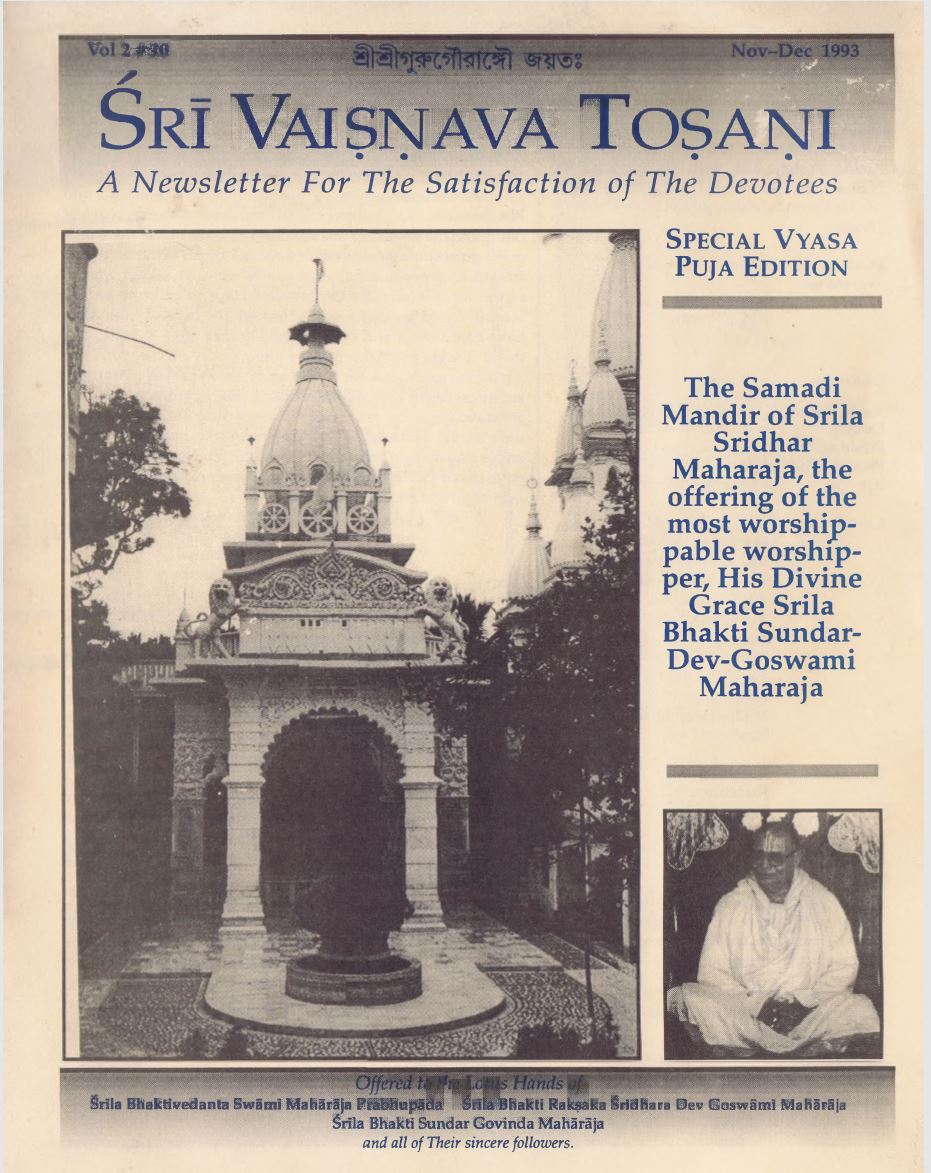by Srila Bhakti Raksak Sridhar Deva-Goswami Maharaj
Question: In Śrī Brāhma-saṁhitā it is described that Śrī Śrī Rādhā and Kṛṣṇa are seated on a divine throne, and the whorl of the lotus flower upon which They are seated is described as a hexagonal figure. What is the meaning of this hexagonal figure and how can this be drawn?
Śrīla Guru Mahārāj: I am sorry, but we are not to enter into the discussion of such higher and subtle position of the līlā of Rādhā-Kṛṣṇa. That is not to be brought into public, and that is the distinction between the Gauḍīya Maṭh and the sahajiyā section. The sahajiyās are trying to imitate all these things, but we have no faith in imitation. The higher līlā will come in an individual case, and it will awaken in an irresistible way. When the program of the sādhana stage is finished it will come automatically, spontaneously. We are believers in that, and not to know the form already and then we will reach there—that is not the policy accepted by Guru Mahārāj, Prabhupād: pūjala rāga-patha gaurava-bhaṅge.
Śrīla Bhaktivinod Ṭhākur also said, “Stick to the rulings of the class you are fit for, then you will see automatically.”
yathā yathā gaura-padāravinde
vindeta bhaktiṁ kṛta-puṇya-rāśiḥ
tathā tathotsarpati hṛdy akasmād
rādhā-padāmbhoja-sudhāmbu-rāśiḥ
(Śrī Chaitanya-chandrāmṛta: 88)
Strictly stick to Gaura-līlā, Mahāprabhu, and you will find automatically within your heart that Rādhā-rasa-sudhānidhi is flowing. Don’t attempt directly to have it. It will come automatically, spontaneously. Not intellectually you shall approach that, for that will give you a bad prejudice. Not only that, but it will be harmful prejudice and you will have to expend more energy to do away with that layer of misunderstanding. So our Śrīla Prabhupād did not allow these things.
Do your duty in your plane, according to what you deserve, and that will come naturally. That is his instruction all through, not only temporarily, but all through. Don’t go to be a disbeliever and be very eager to see the final result. Don’t do like that, for then you will get māyā instead of Yogamāyā.
He knows it fully well, She knows it fully well, when you are to be taken in to the confidential area, and that cannot be acquired by any other thing but His sweet will—the flow of Her sweet will, or His sweet will. Try to have the natural thing, not any thing of imitation or any reflection. Reflection and shadow, these two kinds of misconceptions may come there. Reflection is more dangerous.
In Harināma also it has been stated like that. Reflection and shadow, both are misguiding. And we are to cross that. On our way that sort of temptation may come, but we must not think that everything will come within the fist of our intellect.
achintyāḥ khalu ye bhāvā
na tāṁs tarkeṇa yojayet
(Mahābhārata: Bhīṣma-parva, 5.22)
That which is inconceivable, don’t take it under the jurisdiction of reason. When it will be extended to you, you will be astounded only to find a peep into that. Na tāṁs tarkeṇa yojayet: don’t try to drag that into the zone of reason. This is autocratic in its nature. It may come in one shape to you, it may go in another shape to another gentleman. It is so expansive and so free in its nature. It is infinite. Rather the Infinite is the base of those Pastimes. Always prepare yourself. Hanker. But don’t make it an object of your experience.
When Mahāprabhu talked about the higher līlās it was as if He was in a trance. As if in a trance He gave a description of His wonderful experience of Kṛṣṇa-līlā. Several times we find that sort of deep līlā, the higher līlā of Kṛṣṇa being related by Mahāprabhu Himself, the Govardhan-līlā and the Jalakeli-līlā when He jumped unconscious into the ocean and for a few hours was carried by the waves of the sea to Chakra-tīrtha from Swargadwār. The Jalakeli of Kṛṣṇa, He described how it is. Also at Chaṭak-parvat—there is no end to His līlā. When His body was transformed like a pumpkin, then also He described a līlā, but the nature of that description was not any book-produced thing. It cannot be taken into black and white. It is such thing. So we receive caution often, that: “Don’t try. It will come automatically. Go on with the program that is given by the śāstra and the Guru and it will be. If you have such possibility of fortune then it will come to you. It is not a natural experience that can be given to this and that. It is not to be tackled in such way.”
yathā yathā gaura-padāravinde
Engage your full attention in Gaura-līlā and that will come automatically within you. From the indirect way it will come to you from the higher domain. When it will be pleased it will come down for some time to give you experience, and you will simply be astonished: “What is this!” Then even when gone, withdrawn, you will have nothing to lament. It is a living thing. Try to come to get the whole. We cannot make it our object. Such higher thing! Such higher thing.
Even it is very hard to get an ordinary man’s conduct with his intimate friends, and so it is with the līlā of the Supreme Lord. How can we dare to enter into that, and especially publicly? It is not possible. Externally we can try to give some description of the outer possibilities, but not the actual thing. We won’t venture to enter there.
Question: Can they draw something general, like a lotus flower?
Śrīla Guru Mahārāj: A lotus flower is representing the idea of beauty, softness, and such things. And different petals representing different platforms of rasa. In such a way we can take it—beauty, softness. No mundane ideas should be drawn there—only distant similarity. But categorical difference should always be there.
Even we are not allowed by our Master to read the books where They are described: Govinda-līlāmṛtam, even Stava-kusumāñjali, even Ujjvala-nīlamaṇi. He did not allow us to study and to discuss it. Rather, he would be very much disturbed, disturbed if he heard that someone is interfering with the higher līlās in those books. He did not like it.
Duṣṭa phala karibe arjjana—Śrīla Bhaktivinod Ṭhākur gives warning that you will get only a bad result if you venture to cross the line. A bad effect will come to you. Aparādha. From the lower position, anartha, the steps are shown. Śraddhā, sādhu-saṅga, śravaṇ, kīrtan, then anartha-nivṛtti—the undesirable things will vanish altogether. Then ruchi, then āsakti, then bhāva-bhakti—the sprout of real devotion. Then prema-bhakti, and sneha, mān, praṇaya, rāga, anurāga, bhāva, Mahābhāva. By such steps we are to approach there.
Once Prabhupād remarked, though how you will take it I do not know: one gentleman, of course he was a senior, wanted to discuss these things with Prabhupād. He laid much stress on that, and ultimately he left the association of Prabhupād and lived a secluded life. Previously he did much service to the Mission, that gentleman. Prabhupād remarked, “Oh, he has two lives. He is married with Kṛṣṇa and she has got a child.” Such a remark was there that he was a man, but taking himself as a gopī he wanted to culture about the life of the gopīs—the intimate connection of Kṛṣṇa and the gopīs. In this way he wanted to culture intensely, but Prabhupād remarked in that way: “Oh he has turned into a lady, a gopī, and after coming in contact with Kṛṣṇa she produced a child!”
Another time the Guru Mahārāj of Prabhupād—Gaura Kiśor Bābājī—was in a hut near the Ganges. Another disciple of Prabhupād, leaving Prabhupād went to imitate Prabhupād’s Gurudev, Gaura Kiśor Bābājī, and constructed a tiny hut nearby and imitated his bhajan, Harināma and the discussion of Narottam Ṭhākur—all these things—and observed strict vairāgyam in his physical life. Gaura Kiśor Bābājī remarked one day that only by entering a labour room and imitating some pain of giving birth to a child, a child will not come by that imitation of the sound. Many important previous events are necessary, then a child will come. Only imitation will not give birth to a child. Such was his remark to that gentleman.
So, śuddha-sattva, pure goodness, you must come in connection with what is known as śuddha-sattva first. Viśuddha-sattva, the nirguṇa world. Śuddha-sattva means nirguṇa. You must come in connection with nirguṇa, then only may you try to approach the subtle happenings or events there.
So, we are not to satisfy curiosity. ‘Fools rush in where angels fear to tread.’ With this spirit we must approach the whole thing. At the same time we may not be, by God’s grace, a disbeliever by considering, “I shall judge the whole thing to the last details, then I shall accept what you say.”
There are many things below, but the charm and reasonableness of the higher plane, that is enough to convince a person to come this side, and these high līlās should be left high above your head. Very cautiously we are to handle all this līlā, especially Madhura-līlā.
Just the other day I was thinking, about a year after joining the Mission, Prabhupād arranged for the full Kārtik month to preach in Vṛndāvan. He asked the Mahārāj, Bhāratī Mahārāj at that time, to explain the Seventh Canto of Śrīmad Bhāgavatam: the story of Prahlād, not the story of Kṛṣṇa, Rādhā-Kṛṣṇa, Yaśodā or anything of Vṛndāvan, but, “Preach śuddha-bhakti of Prahlād first. They are all ripe in sahajiyā. Just try to make them understand that ‘Enter into the plane of bhakti; what to speak of Kṛṣṇa-līlā—that is far, far above.’ ”
So, in Vṛndāvan the people rather wondered, “What is this? They are explaining Bhāgavatam, but leaving the Tenth Canto they are explaining the Seventh Canto, the Prahlād-līlā, the lower portion of bhakti. That is wonderful and strange.”
Again, I found later on that Śrīla Prabhupād himself gave a lecture between Rādhā-Kuṇḍa and Śyāma-Kuṇḍa. There is a boundary line between the two. There he used to explain for a few days. The Upadeśāmṛtam of Śrīla Rūpa Goswāmī was read by him and explained. He did not explain about Śrīmatī Rādhārāṇī, not about Kṛṣṇa, but about that Upadeśāmṛtam—the basis. His attention was always towards the basis, and the fruit will come of itself: “Pour water onto the root; pour water onto the root, and the fruit will come up itself.”
He himself explained this while sitting in the middle between Rādhā-Kuṇḍa and Śyāma-Kuṇḍa. He explained not only Bhāgavatam, but Upadeśāmṛtam. Upadeśāmṛtam is the substance of Mahāprabhu and the language of Rūpa Goswāmī.
vācho vegaṁ manasaḥ krodha-vegaṁ
jihvā-vegam udaropastha-vegam
etān vegān yo viṣaheta dhīraḥ
sarvām apīmāṁ pṛthivīṁ sa śiṣyāt
And the last śloka:
kṛṣṇasyochchaiḥ praṇaya-vasatiḥ preyasībhyo ’pi rādhā
kuṇḍaṁ chāsyā munibhir abhitas tādṛg eva vyadhāyi
yat preṣṭhair apy alam asulabhaṁ kiṁ punar bhakti-bhājāṁ
tat premedaṁ sakṛd api saraḥ snātur āviṣkaroti
These topics were explained by Śrīla Prabhupād and not even anything of Govinda-līlāmṛtam or Viśvanāth Chakravartī’s Śrī Kṛṣṇa-bhāvanāmṛta—these things were left. So, our training was in this line.
Pūjala rāga-patha gaurava-bhaṅge, that is always upon our head, that the prospect of our life’s future, life after life, cannot be finished. We shall rather foster the hope, the pure hope that we may be taken in one day in that camp. With this idea.
Question: Sometimes in Śrī Chaitanya-charitāmṛta, Śrīla Kṛṣṇa Dās Kavirāj Goswāmī makes reference to Govinda-līlāmṛtam, Ujjvala-nīlamaṇi and other such confidential selected works. How are we to take that?
Śrīla Guru Mahārāj: There are three chapters of Śrī Chaitanya-charitāmṛta that we were generally not allowed to enter into, including the discussions with Rāmānanda Rāy, to a certain extent. Where the līlā portion of Rādhā-Govinda is mentioned, we had no entrance into that līlā. Of course when pārāyaṇ (consecutive chanting of the whole book) is going on, we go on reading. But not to enter into details of discussion about that. At that part we went on reading but without giving any particular attention to the līlā of highest order of rāga. That was barred: “Don’t try to come into details there. That will come automatically when the time will be. Do not make it a discussion of the public. Don’t take it in the public eye.”
So much so that the following incident happened in Vṛndāvan. Prabhupād had a friend there from his childhood, an attorney, who came to see him, so Prabhupād went to give a return visit to this friend from his boyhood. Śrīpād Paramahaṁsa Mahārāj was with Prabhupād and they went to give the return visit. They were told, “He is upstairs.” They went there and saw that a Goswāmī was explaining the Rāsa-līlā section of Śrīmad-Bhāgavatam. Prabhupād just bowed down his head and came away. Immediately he came away. Then his friend also came down, leaving that Rāsa-līlā discussion, and said, “Yes, the Rāsa-līlā explanation is going on, but you did not take your seat at all. You just bowed down your head and came down. What is the matter?”
Śrīla Prabhupād replied, “Our Gurus’ order is such that, ‘If you attend Rāsa-līlā explanation you will commit offence.’ That will be offence to attend Rāsa-līlā explanation, so I cannot stand there even for a second. I had to come back. This is my Guru’s order. To attend Rāsa-līlā explanation is aparādha.”
So, for us, such strict behaviour he has shown. And we also do that, especially myself. At so many other places they show the Rāsa-līlā with dolls, but I never do that. Following what is true to my understanding of my Gurudev’s will and his words, I do not make any show of Jhulana-līlā or Rāsa-līlā or anything of the type. I find in my heart that this is not desirable of my Guru Mahārāj.
But in so many maṭhs I see at present, I hear also, that they are doing that, but I strictly abstain from that sort of showing. The Jhulana-līlā, the Rāsa-līlā. That is too high for us, I considered. I must be true to my hearing of the words of my Gurudev if I want my realisation and not any position: the position of some sort of popularity. To attract people by such show, and to make money, or to make a favourable field for preaching, they may do like that, but I do not do. I do not want popularity nor any position of a higher Āchārya. I am a student.
Still I am a student. I consider myself to be a student. A faithful student. What I heard from my Gurudev, I try my best to stick there, to keep my position there as I heard from him. I do not want to mutilate that in any way to suit my purpose. I try not to do that. Of course for big propaganda they may take different ways as they think. They are now free. But I am not a member to do so—to go on in such way. I try.
When Prabhupād offered me to go to the West, I replied simply that I did not consider myself fit to go the West, “I will not be able to show success there.” I mentioned two defects. Then some of the sannyāsīs showed much reverence to me, “What is this? So many persons wish this opportunity. You are prepared to lose this chance? You neglect to take advantage of such a position, that you will be a world preacher. Do you have no hankering for that?”
I replied, “Yes, Mahārāj, I have no hankering to have such a position. My only humble ambition is that I may be reckoned as a sincere devotee of Mahāprabhu, Śrī Chaitanyadev. No other ambition I have in my mind such as to become a world preacher and so on.”
In my nature I am such. I want truth, and I hope and crave for the mercy of the Vaiṣṇavas and you all that I may not have that ambition, but to be the humblest, the most humble servant of the Lord, that I may not be misguided.
I may engage myself in the lower form of service. Tad dāsa-dāsa-dāsānāṁ dāsatvaṁ dehi me Prabho. My faith may be so firm and may be of such quality that the least offer of His service, of divine service, may satisfy me. I may not be ambitious to run high, to get the chance there in the higher officer class. With my lowest connection with the Divinity I may go on satisfied with my life.
Mahāprabhu says, “Just consider Myself a speck of dust at Your feet, Kṛṣṇa.”
ayi nanda-tanuja kiṅkaraṁ
patitaṁ māṁ viṣame bhavāmbudhau
kṛpayā tava pāda-paṅkaja
sthita-dhūlī-sadṛśaṁ vichintaya
(Śikṣāṣṭakam, verse 5)
“O Nandanandan, son of King Nanda, although I am Your eternal servitor, I have fallen into the terrible ocean of material existence due to the fructification of My own deeds (karma). Please graciously consider Me to be a particle of dust at Your lotus feet.”
That may be our guidance. “Consider me to be one of the specks of dust that are at Your feet.” That is too much! Our faith should come to such a grade in quality that we may be satisfied to become a speck of dust at His feet. Then by His sweet will, anything may happen. But our humble aim should be to have even the least connection of the Divinity real. Not a concocted Kṛṣṇa.
pūjala rāga-patha gaurava-bhaṅge
Very sweet. The rāga-patha is on the head. We are servants of the Rāga-patha. We are in vidhi-mārga, under śāstric rule. We must live and move under śāstric rule, and always keep the rāga-patha upon our head.
Once an incident happened while our Śrīla Prabhupād was at Rādhā Kuṇḍa. A pāṇḍā in his talk made a side remark that, “We are brāhmaṇas in Vraja. We can bless Raghunāth Dās Goswāmī.” Prabhupād was perturbed by such a haughty remark, “Dās Goswāmī is our highest Āchārya in our camp, in the Gauḍīya camp. And that fellow he says that he is able to bless Dās Goswāmī, and I am to hear that?” He stopped taking food, and remarked, “If I was an ordinary bābājī I would not care. I would leave the place. But I am running with a motorcar here as an Āchārya. I have the responsibility. I am moving here in the pose of an Āchārya that I shall protect the sampradāya. I shall brush the dusts of undesirability from the sampradāya. How can I tolerate such a remark against my Guru?”
He left his food: “Until any pratikār [any suitable objection and correction, cure] is given by me, I won’t take any food. I cannot take any food.”
I think I did something to give vent to the feeling of my Gurudev today! I did something today to clarify his position.
Pūjala rāga-patha gaurava-bhaṅge—this is enough. Tad dāsa-dāsa-dāsānāṁ dāsatvaṁ dehi me Prabho…. This is not a figurative thing, this is not mere poetry. Mahāprabhu says:
nāhaṁ vipro na cha nara-patir nāpi vaiśyo na śūdro
nāhaṁ varṇī na cha gṛha-patir no vana-stho yatir vā
kintu prodyan-nikhila-paramānanda-pūrṇāmṛtābdher
gopī-bharttuḥ pada-kamalayor dāsa-dāsānudāsaḥ
(Śrī Chaitanya-charitāmṛta: Madhya-līlā, 13.80)
“I am not a priest, a king, a merchant, or a labourer (brāhmaṇa, kṣatriya, vaiśya, śūdra); nor am I a student, a householder, a retired householder, or a mendicant (brahmachārī, gṛhastha, vānaprastha, sannyāsī). I identify myself only as the servant of the servant of the servant of the lotus feet of Śrī Kṛṣṇa, the Lord of the gopīs, who is the personification of the fully expanded (eternally self-revealing) nectarean ocean that brims with the totality of Divine Ecstasy.”
This is not only an ornamental thing. It is reality. This is reality. To feel ourselves to be actually mean is really to become eligible for the higher service. So much selflessness, so much self-abnegation is necessary for a unit here of the lowest order to enter into that domain. So much self-abnegation is necessary, then we can come into that plane. There is a plane of undercurrent, an undercurrent plane, and if we really want to contact with that, we shall have to be such finest of the fine in us, and with no demand. In this negative way we are to transform ourselves, then we can have a touch of that plane where we can come.
The least tinge of exploiting, any speck of the ambitious life, will not take us there—that is another thing: pratiṣṭhā. Pratiṣṭhā is self-establishing, to be stable, to be immortal, to be invincible—it is not self-giving, but it is the self-establishing tendency: “I must stay. I must live.” But, if necessary, I must die for the interest of Kṛṣṇa.
mārobi rākhobi—jo ichchhā tohārā
nitya-dāsa prati tuwā adhikārā
“Slay me or protect me as You wish, for You are the master of Your eternal servant.”
A suicidal soldier! For the cause of the country, if necessary I must die. I must efface myself. I may be effaced. If it is necessary my very existence may be effaced for the satisfaction of Kṛṣṇa.
“My very existence may be effaced if it is necessary.” Such temperament, such selflessness of such degree is necessary to find out that plane. So much subtleness.
Let us be blessed by Prabhupād Śrīla Saraswatī Ṭhākur. All glory to Guru and Gaurāṅga. All glory to Guru and Gaurāṅga.
(To the devotees gathered there.) You are helping me to take out from my inner heart so many beautiful and so many valuable things. It is through your help that these old memories are coming again fresh to me. I am forced to take out those things of the inner nature of my previous life which I got from my Gurudev as wealth. Again I have the chance of seeing that treasury. I am given the opportunity by this recapitulation of what I heard from the divine feet of Gurudev.
This is our education, what I got from the divine feet of Gurudev. I just sincerely put it to you all. It is such.
pūjala rāga-patha gaurava-bhaṅge
He instructed that we must not go to live in Rādhā Kuṇḍa. One day near Lalitā Kuṇḍa, the Swānanda Sukhada Kuñja is there, and there is a single-storey building. He said, “A second storey is necessary, but I will not be able to live there.”
I asked, “If you will not live on the first floor, who will live there? What is the necessity of further construction?”
“No. You don’t know. Better persons will live there: Bhaktivinod Ṭhākur, Gaura Kiśor Bābājī Mahārāj. They will live there, and we shall stay on the ground floor and we shall serve them.”
Again he said, “I shall live in Govardhan. Rādhā Kuṇḍa is the highest place: the place of our Guru Mahārāj, our Gurudevas. They will live here in closer connection with līlā, but we are not fit to live there. We shall live in Govardhan, just a little far away. Because we shall have to come and serve our Gurudev, we must be near, but we must not live in closer connection with them. We are not fit.”
pūjala rāga-patha gaurava-bhaṅge
The whole tenor of his life was such: “That is high, high. And from below we are to honour that.” We are to establish in the whole world this sort of posing: the proper regard of that higher līlā: “That is too high.”
One day in Allahabad—perhaps it was that very year Śrīpād Swāmī Mahārāj was initiated—while speaking in a park Śrīla Saraswatī Prabhupād said, “I am out to give a challenge to fight with any person to show that the highest position is occupied by my Gurudev, by Śrīla Bhaktivinod Ṭhākur and by Mahāprabhu. Let anyone come to fight with me to decide. I am ready. I am ready to give that challenge to anyone and everyone. Let them come to fight with me. I am ready to establish the throne in the highest place—my Gurudev.”
pūjala rāga-patha gaurava-bhaṅge
Originally printed in Guardian of Devotion (Kolkata edition)

